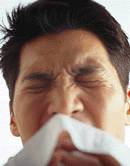- The Best Time of Day to Drink Bone Broth to Maximize Health Benefits
- 8 Ways to Increase Dopamine Naturally
- 7 Best Breads for Maintaining Stable Blood Sugar
- Gelatin vs. Collagen: Which is Best for Skin, Nails, and Joints?
- The Long-Term Effects of Daily Turmeric Supplements on Liver Health
- Could Your Grocery Store Meat Be Causing Recurring UTIs?
- Are You Making This Expensive Thermostat Error This Winter?
- Recognizing the Signs of Hypothyroidism
- 10 Strategies to Overcome Insomnia
- Could Artificial Sweeteners Be Aging the Brain Faster?
So Long Snow, Hello Pollen


Although it still feels like winter in many parts of the United States, it’s time to prepare for spring allergies, an expert says.
“Even with snow still on the ground, trees have started budding and are the first to produce pollen, creating major problems for people with allergies,” said Dr. David Rosenstreich, director of the division of allergy and immunology at Montefiore Medical Center in New York City.
“The symptoms people experience often resemble a common cold, but, if it happens every year at this time, it’s most likely allergies,” he said in a center news release.
Taking over-the-counter or prescription medicines now can be beneficial, Rosenstreich said.
“By taking medicine early, you can prevent the symptoms before they begin,” he said. “If you start after the symptoms are in full swing, it’s much harder to stop the allergic reaction than to prevent it from the beginning.”
There are a number of other ways to relieve allergy symptoms, including keeping your home and car windows closed to keep pollen out and turning on your air conditioning early to filter the outside air that comes into your home.
Other tips include: limiting outdoor activities on days with high pollen counts; washing your hair after being outside; not raking leaves or mowing the lawn, which stirs up pollen and molds; and not hanging clothes or sheets outside to dry.
“There’s no reason for people with allergies to suffer,” Rosenstreich said. “As long as you take the proper precautions, you should be able to enjoy the outdoors and make the most of the warm weather.”
About 50 million Americans have pollen allergies, commonly known as hay fever. Symptoms include sneezing; stuffy or runny nose; itchy nose, throat and eyes; watery eyes; and dark circles under the eyes.
More information
The U.S. National Institutes of Health has more about hay fever.
Source: HealthDay
Copyright © 2026 HealthDay. All rights reserved.










